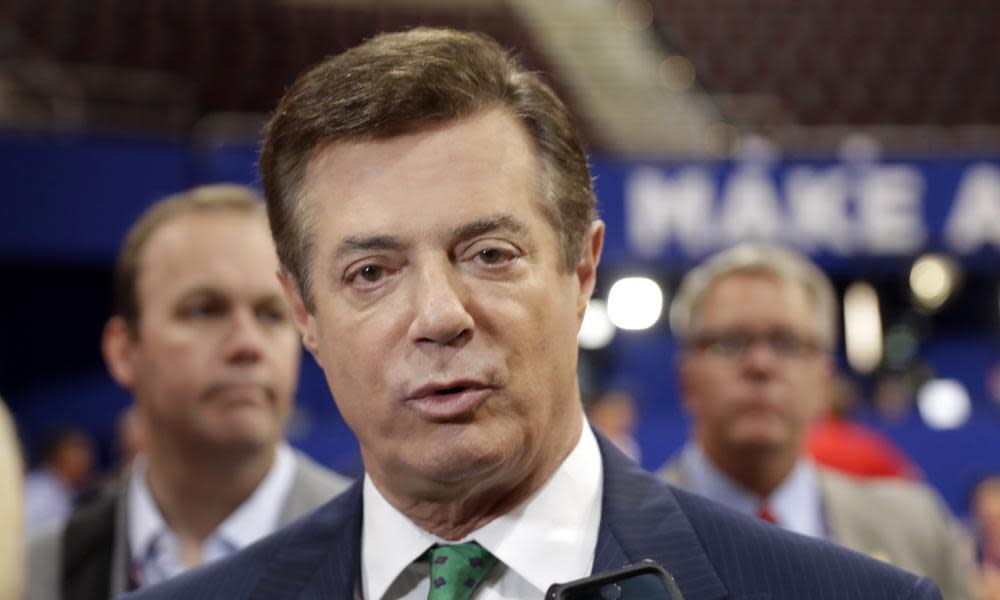Think Paul Manafort is about to sink the White House? Hold your horses | Walter Shapiro

When Paul Manafort, a Ronald Reagan veteran, moved to take charge of the amateur-hour Donald Trump campaign in early April 2016, the press coverage was respectful, even a bit fawning.
Former New York Mayor Rudy Giuliani was quoted in the New York Times calling Manafort’s ascension “a step in the right direction” and in the same story Republican pollster Tony Fabrizio hailed the move as welcome evidence that Trump knew that he needs to hire “experienced and seasoned hands.”
Since campaign reporters are suckers for sage political hands, Manafort’s career as an international influence peddler only attracted intermittent interest. A May 2016 Wall Street Journal story on lobbyists in presidential politics devoted just one sentence to Manafort “whose firm in the past represented a number of foreign governments”.
That bland statement was the equivalent of describing the first world war as a small territorial misunderstanding among European nations. This week we learned, through a series of leaks, that Manafort’s foreign entanglements appear to be a central target of Robert Mueller’s investigation.
The New York Times provided fresh details (including a picked lock) about a predawn July FBI raid on Manafort’s apartment searching for foreign bank records and computer files. Manafort’s emails, according to the Washington Post, reveal that the Trump campaign chairman offered a Russian oligarch, close to Vladimir Putin, private briefings on the presidential race. Phrases like “black caviar” in the emails allegedly refer to the kind of payoffs that Manafort had hoped to obtain from Russian interests.
In fact, there are now so many documents about Manafort in governmental hands that they may have to name a federal records depository after him. CNN reported that the FBI had been periodically wiretapping Manafort under a secret court order since 2014 flowing from his work for ousted pro-Russian Ukrainian strongman Viktor Yanukovych.
Yes, it is dizzying to keep up with. Especially during a week when the Times led the paper with a story that Mueller has requested White House documents relating to the firings of ethically compromised national security adviser Michael Flynn and embattled FBI director James Comey.
For those of us who wake up every morning with a sense of dread that Trump has nuked Denmark overnight, it is tempting to take these investigative fragments and imagine Chief Justice John Roberts presiding over an impeachment trial in the Senate. Or to picture a high-profile federal trial in which Manafort details the Trump campaign’s direct coordination with Vladimir Putin.
There is only one problem with these liberal fantasies – suggestive incidents do not automatically add up to unequivocal evidence.
Maybe grifters and fixers gravitated to the Trump campaign because they saw an opportunity for personal enrichment. A Manafort email from April 2016 asked an associate, “How do we use [the campaign] to get whole?” During the campaign, as Newsweek reported, Flynn, was flogging a business plan to build a series of nuclear reactors in the Middle East with partial Russian backing.
Even Jared Kushner had far more on his mind than electing his father-in-law president. The Kushner family real-estate empire has been tottering under the weight of the debt burden from its ill-considered $1.8bn purchase of a Fifth Avenue office building. The Kushner company, according to Bloomberg, “has failed to secure foreign investors, despite an extensive search, and its resources are more limited than generally understood”.
It was worth remembering that few in Trump Tower during the campaign had any realistic expectation that a bilious billionaire turned reality-show host could be elected president. As a result, a certain get-it-while-you-can ethos appears to have shaped the behavior of insiders like Manafort, Flynn and Kushner.
In legal terms, maybe all that Trump is guilty of is terrible taste in campaign advisers and bad luck with his son-in-law.
Even Russia’s use of Facebook and other social media platforms to boost Trump during campaign does not prove collusion. The reported $100,000 in illegal Russia campaign ad purchases on Facebook did not have to depend on the Trump campaign for targeting. Many Republican strategists would have happily advised anyone masquerading as a pro-Trump American-based Super Pac.
None of this is meant as a defense brief for Trump. Rather, it is a reminder of the high bar of proof needed to convince Americans who do not avidly watch MSNBC that Trump’s conduct warrants being removed from office.
I asked two Republican campaign consultants, both Trump critics, what it would take to convince a significant fraction of the Republican base to support impeachment. The answer: a piece of paper signed by Trump cutting a deal with Russia for financial gain.
In short, to use the Watergate phrase, “a smoking gun”. Right now, based on what we know from the Mueller investigation, all we have are some troubling bullet holes.
This article was updated on 23 September 2017 to correct Chief Justice John Roberts’ name. We erroneously had him as Paul.
Walter Shapiro is a lecturer in political science at Yale and a fellow at the Brennan Center for Justice

 Yahoo News
Yahoo News 
